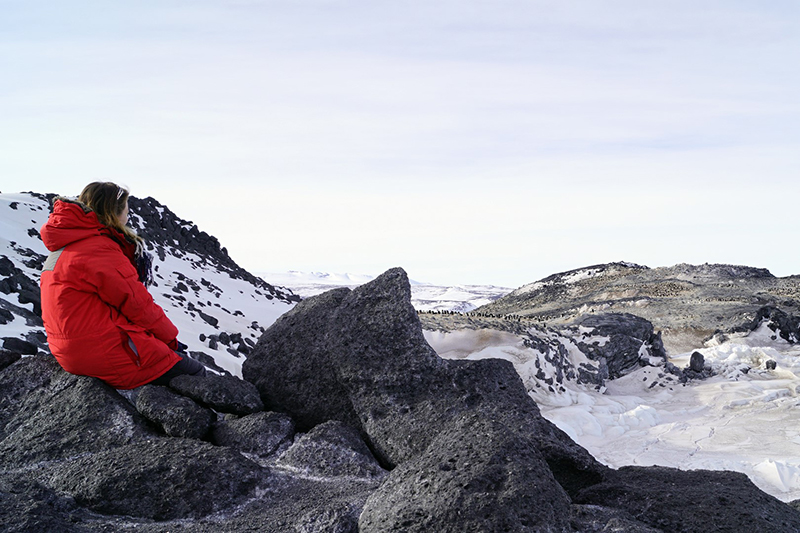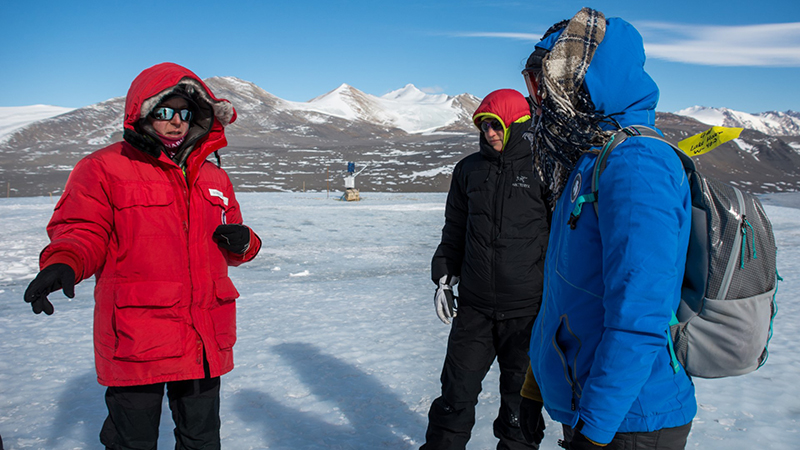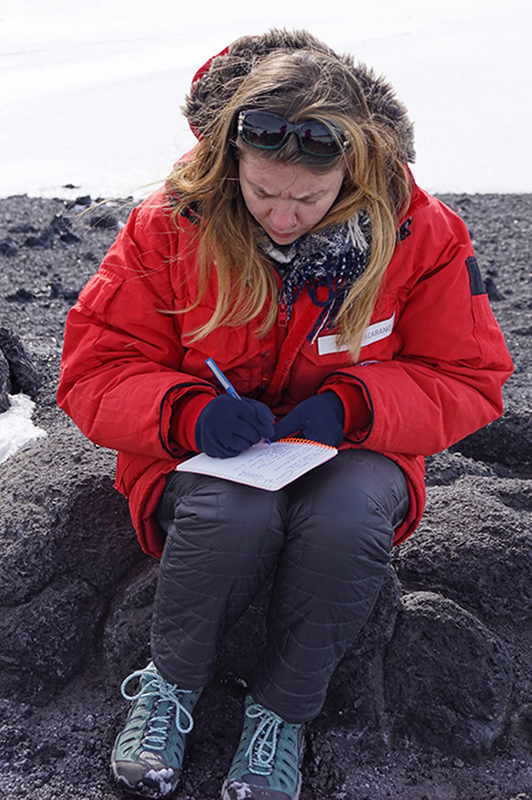
Photo Credit: Elaine Hood |
Caitlin Scarano sits overlooking the penguin colony at Cape Royds. |
The Reality and Revisioning of Antarctica
In search of the elusive meaning of "Wilderness"
By Elizabeth Delaquess, ANTARCTIC SUN GUEST WRITER
Posted April 8, 2019
Antarctica is often thought of as a wilderness, both by people who have never been to the continent and people who have worked and lived there for years. Writer Caitlin Scarano wants to challenge the very notion of wilderness.

Photo Credit: Mike Lucibella
At Lake Hoare, Caitlin Scarano interviews camp manager Anne Beaulaurier about the nature of wildnerness.
Scarano, who received her doctorate from the University of Wisconsin-Milwaukee in December, spent four weeks at McMurdo Station and its surroundings. While there, she met with members of the McMurdo community to gather their stories and hear their impressions of the southernmost continent. She wanted to learn the different ways in which people experience the landscape, and how one’s definition of "wilderness" affects the way they interact with their environments, especially remote environments like Antarctica.
She came to the icy continent as part of the National Science Foundation’s Artists and Writers Program, which supports selected individuals traveling to Antarctica for their work.
Scarano has been writing about human interactions with wilderness for a long time. After earning her undergraduate degree at James Madison University and an MA from Bowling Green State University, Scarano moved to Fairbanks, Alaska to pursue a Master of Fine Arts in Poetry. Fairbanks may seem like a leap for someone who grew up in Virginia, but Scarano has been fascinated by remote, wild places since childhood.
"I was really interested in literature of children or adolescents who are on their own in the woods," she said, citing books like The Hatchet by Gary Paulsen and My Side of the Mountain by Jean Craighead George. "I was also interested in sled dogs and thought I wanted to become a dog musher. I was very into books by Jack London, like White Fang."
The three years that Scarano spent in Fairbanks proved to be a formative experience for her.

Photo Credit: Mike Lucibella
Scarano treks across the Canada Glacier, adjacent to the Lake Hoare field camp.
"I quickly discovered that [Alaska] is much more complex and interesting in ways I couldn't see without living there," she said. "That is also the time I got serious about writing. I tried to write most days if I could… I was in a really close-knit community of writers. I lived in a cabin alone for part of that time, and that was pretty good for holing up and working. I didn't have a cell phone or Internet for a while. I listened to NPR in the mornings and wrote. I am trying to get back to that."
Themes reflective of life in a wood stove-heated cabin can be found throughout Scarano’s short fiction and poetry, especially in her flash fiction piece Pitcher of Cream. Her works tend to be visceral and rich in imagery of wild places, human and animal interactions, gender and sexuality, emotion, and sensations.
However, despite the strong nature themes in her work, Scarano doesn't consider herself a nature writer.
"There is often a sense of place," Scarano said. "I'm interested in humans as animals and what that metaphor means; blurring the lines between those divisions we have as humans versus animals, male and female, past and present and future."
As well as breaking down these barriers in her previous works, Scarano is interested in challenging the idea that Antarctica is a pristine wilderness. At a lecture for the McMurdo community, Scarano delved into the meaning of wilderness and how people define it. Following interviews with scientists and support staff at McMurdo Station, she said most of the people she queried identified Antarctica as a wilderness.

Photo Credit: Mike Lucibella
Atop the Canada Glacier, Scarano (right) interviews researchers Dorota Porazinska (left) and Pacifica Sommers.
"I proposed the idea that using the framework from [environmental historian] Bill Cronon's essay The Trouble with Wilderness; what if wilderness is a human construct and not an actual thing or place? What does that mean for Antarctica?" Scarano said. "We talked about how one of the most common words people use to describe this place is 'pristine,' I thought that was interesting because it's at odds with the actual pollution that’s here, and so I talked a bit about that. Is it pristine here? Is it polluted? Is it both?"
Not one to let conventional wisdom lie, she is keen on challenging many long-held beliefs about the continent.
"We also talked about the history [of exploration in Antarctica] and how it has been a short history, but predominantly comprised of white men. The idea of wilderness and frontier discovery can be very masculine," Scarano said. "How does the idea of wilderness relate to issues of gender, class, race and ability? This led to a conversation about who is represented here at McMurdo and in Antarctica. Who has access to the continent and who does not? How does that shape community here?"

Photo Credit: Elaine Hood
At the Cape Royds penguin colony, Scarano jots down observations in her notebook.
Following her visit to McMurdo, Scarano expects to move away from the poetry she has done in the past and focus more on writing essays. As part of her examination on humans and our definitions of wilderness, she is interested in the history of dogs in Antarctica and how they have been used to shape human development on the continent. She is also mulling over how people in Antarctica have tailored their interpretations of history and past experiences to meet a cultivated image over the years, citing the restored huts at Cape Evans, Cape Royds, and Hut Point as examples of history that has been "curated" and represented in a certain way that may differ from how it was originally.
"Nothing is as it seems down here, and nothing is simple, and you're viewing anything, whether it's a landscape or the history of this place, through a lens," Scarano said. "Even if it's the lens of your own experience and the connotations that your brain brought to the table. This is both reality and revisioning."
Her hope for these essays is not to convey a specific message, but to encourage people to think about concepts and their understanding of the world in new ways.
"I'm interested in making people curious," Scarano said. "Whether it's a poem or an essay, [I'm interested in] writing something that makes someone think in a new way about something, maybe pausing to reexamine their own life or their own assumptions, and get some new way of thinking about an experience that they might not otherwise have."









